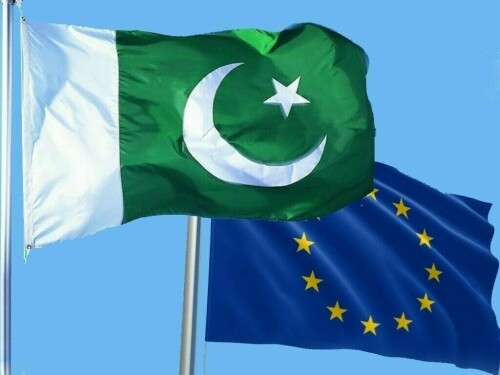Pakistan’s GSP+ Status Under EU Review
The European Commission is currently assessing Pakistan’s eligibility for the European Union’s (EU) GSP plus (+) scheme, a crucial trade advantage. This evaluation focuses on Pakistan’s adherence to international standards concerning human rights and governance.
This assessment was highlighted by Dr. Martin Henkelmann, CEO of the German Emirati Joint Council for Industry and Commerce (AHK UAE), and Florian Walther, the Pakistan Representative at the same council, in response to inquiries.
The GSP+ (Generalized Scheme of Preferences Plus) has been essential for Pakistan’s export-oriented economy, facilitating duty-free entry for over 76% of its exports to the EU, mainly textiles and garments.
Since Pakistan became part of the scheme in 2014, exports to the EU have more than doubled, hitting €8 billion in 2023, including €2.4 billion to Germany, making the EU Pakistan’s largest export market.
The current review, initiated in June 2022, extended GSP+ trade benefits to Pakistan until 2027. The results of the assessment on the 27 conventions will determine whether the EU will extend Pakistan’s GSP+ status beyond 2027.
Henkelmann and Walther stated, “Pakistan’s GSP+ status is systematically reviewed by the European Commission as part of the ongoing monitoring cycle. The Commission has not yet issued a formal conclusion, but recent events, such as the EU Special Representative for Human Rights Ambassador Olof Skoog’s visit in late January 2025, underscore the importance of this process.”
A GSP+ monitoring mission is planned for June 2025.
According to the German officials, the EU and Pakistan are engaged in continuous dialogue to improve compliance with the 27 core international conventions related to human rights, labor rights, environmental protection, and good governance.
“In our discussions with stakeholders in Pakistan, including chambers of commerce, export associations, and the business community, it is consistently emphasized that GSP+ is not only a trade preference but also a critical driver of employment, growth, and economic diversification. There is a broad understanding that continued progress on GSP+ requirements is both necessary and in the country’s long-term interest,” they added.
The EU has updated the GSP+ framework to address evolving global priorities. The revised scheme includes more conventions, stricter procedural obligations, and a requirement for beneficiary countries to submit detailed action plans.
“Pakistan has been granted a two-year transition period to comply with the new standards.”
The extension of the monitoring cycle from two to three years allows for more thorough evaluations and aligns the process with international mechanisms.
Pakistan must now show tangible reforms.
Given the pressure on exports and the jobs linked to EU market access, Pakistan’s ability to retain GSP+ will depend on its capacity to adapt to the stricter framework and reassure partners like Germany of its commitment to reforms.
The EU has updated the GSP+ framework to address evolving global challenges and policy priorities. The revised scheme introduces additional international conventions and sets out stricter procedural requirements, including the obligation for candidate countries to submit a detailed action plan demonstrating how they will implement these conventions.
“For existing beneficiaries like Pakistan, a transitional period of two years has been granted to ensure compliance with the enhanced obligations. The extension of the monitoring cycle from two to three years also aligns the process more closely with international treaty mechanisms, allowing for deeper, more structured evaluations. These updates aim to preserve the integrity and effectiveness of GSP+.”
For Pakistan, this means that continued access to the scheme now hinges even more clearly on measurable reforms.
The GSP+ status has driven robust export growth, especially in the textile sector, and is a key element of EU-Pakistan economic relations.
The continuation of GSP+ is essential for maintaining export competitiveness, generating employment, and sustaining bilateral trade momentum.



Comments (0)
No comments yet. Be the first to comment!
Leave a Comment